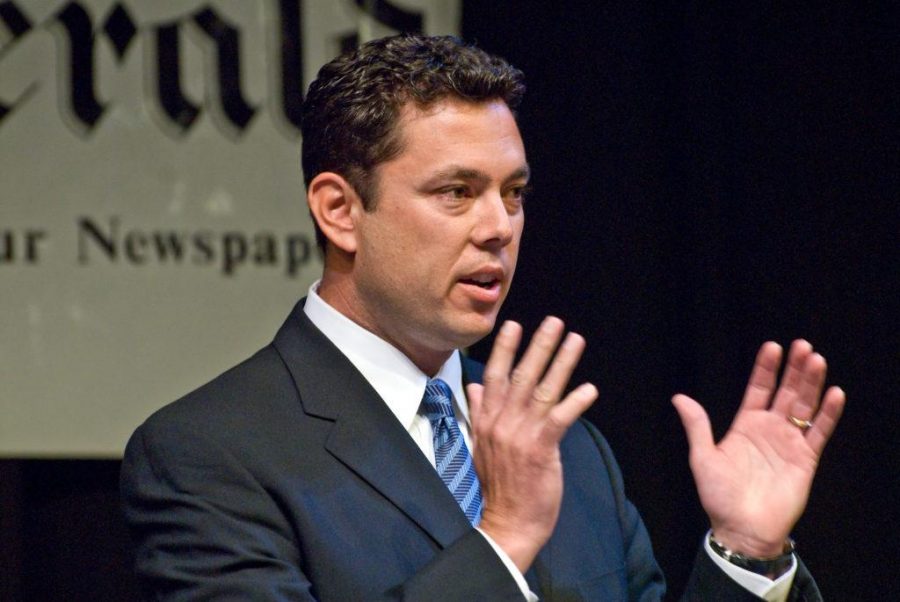There is no catchy Schoolhouse Rock tune to guide Utah through the uncharted political territory the third congressional district is about to enter. While the governor and the legislature allegorically split constitutional hairs, Utah Representative Jason Chaffetz is on his way home, with one foot out the door already.
A politician resigning before the end of his term is not unheard of. Whether because of scandal, failing health, a desire to spend more time with family or any other reason, it happens. Some reasons for leaving office may seem nobler than others; Governors Mike Leavitt and John Huntsman Jr. both left the governorship of Utah in order to serve in presidentially appointed roles. But whatever the given reason may be for leaving an elected position, the fact of the matter remains that if a candidate is going to run for office to be elected, then that candidate has a commitment to the voters.
On April 19, Chaffetz announced that he would not pursue re-election in 2018. Just shy of a month passed before, on May 18, Chaffetz announced that he will withdraw from the United States House of Representatives on June 30, well over a year before the end of his term. Rumors began to swirl that Chaffetz intended on trading in his congressional seat for a shot at governor’s mansion, pursuing a career in the private sector at Fox News, or possibly (as most recently revealed) the path of entrepreneurship as the congressman filed an application on April 17 with Utah’s Division of Corporations to start his own company, according to The Salt Lake Tribune.
This leads to a crucial question voters are forced to consider: Of all of these possible reasons for leaving office, which is more important than ensuring that citizens in Utah’s third district have a voice in Congress? With Chaffetz formally withdrawing from his seat at the end of June, and no special election in the immediate future, Utah constituents will be left without a complete congressional delegation, and citizens in the third district will be left without a voice.
When house vacancies occur — whether by resignation or for any other reason — the U.S. Constitution, in Article I Section 2, mandates the vacancies be filled by election, and that the election is called by the governor. Elections are a pillar of democracy, yet this election is another complication created by Chaffetz’s resignation. While current Utah Gov. Gary Herbert is constitutionally required to call the election, because the last time Utah faced a housing vacancy was in 1929, there is no formal written process as to how this should be done; which brings us to the Utah Legislature. Article IV Section 9 of the Utah State Constitution directs the legislature to craft law governing special elections. If Herbert had called the legislature into special session upon first learning that Chaffetz was resigning, a special election process could have been established in a matter of days. However, Herbert neglected to do this, raising unnecessary tensions between the governor and the legislature. But in this contest, the losers are the people of the state.
In a joint and bi-partisan op-ed on the separation of powers, written by House Speaker Greg Hughes, House Minority Leader Brian King, Senate President Wayne Niederhauser, and Senate Minority Leader Gene Davis, the governor’s abuse of constitutionally defined power as well as the time sensitive nature of the issue are both noted. “Every day in Congress in which Utahns are not represented disenfranchises the citizens of the Third District,” the op-ed reads. “For as long as the vacancy persists, twenty-five percent of Utahns are left without a voice.” The governor may find it hard to escape the reality of the situation with blame coming from both sides of the aisle.
According to local news outlet Good4Utah, multiple potential candidates have already expressed a keen interest in running. Carl Ingwell, Dr. Kathryn Allen, Damien Kidd and John Curtis are among those who may be vying for the empty congressional seat. But as long as the seat remains unfilled, many Utahns will be left without a voice. And therein lies the tragedy. In the interest of filling the seat, the governor has issued a writ of election for November. However, in the event that a suit were brought in district court on state constitutional grounds that the governor had exceeded his authority, and the court were to find that Herbert acted outside of his constitutional prerogative, the results of any election held to find a Chaffetz replacement risk being called into question, the seat is still left vacant, and at the end of the day the losers are still the Utah constituents. To continue down this path, without legislative action to establish legal groundwork, would be to sacrifice principle for expediency.
Chaffetz has done a disservice to the citizens in his district. The governor, whose actions may have serious legal repercussions for the state, has acted impulsively by taking control of the special election process. And the legislature has done a disservice to the state by neglecting to push back. Citizens in the state of Utah should make their concerns known to both the governor and their legislators: principle is important, as is the separation of powers and constitutional government. Those within Chaffetz’s district have an opportunity to make their voices heard when the special election is held in conjunction with the regularly scheduled municipal elections this coming November. Let’s hope those citizens are rewarded with the election of a representative who understands the importance of keeping commitments.
Photo courtesy of Don LaVange


